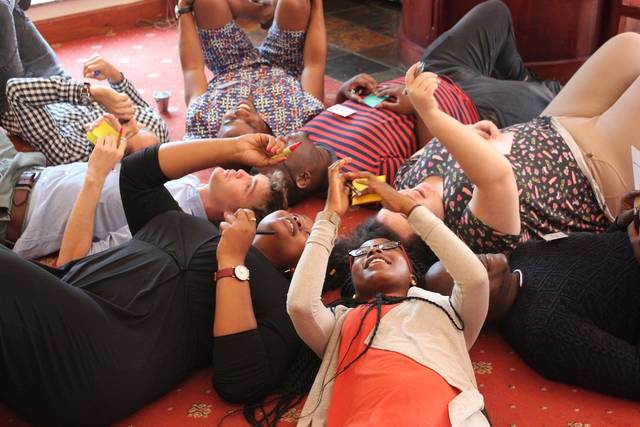
Inside the Programme
Necessity, the Mother of Invention: Lessons on the importance of Entrepreneurship
The Class of 2018 Mandela Rhodes Scholars met for the final module of the year in September, which focused on the topic of entrepreneurship. For the Foundation, entrepreneurship is more than starting a business, although those Scholars who have such aspirations are encouraged to pursue that endeavour. By Entrepreneurship we mean a belief in the critical role played by individual human effort, hard work, innovation and creativity in leading to the betterment of society and Africa’s place in the world. Having reached the precipice upon which the Class of 2018 will launch themselves further out into the world, the topic was both apt and beneficial. The Workshop invited the Scholars to broaden their understanding of entrepreneurship while also grappling with the ways in which they desire to make an impact in their respective sectors.
Entrepreneurship is related to aspects such as creativity, innovation and reform. These are matters of great importance especially on our continent which is in need of creative and innovative solutions to the entrenched problems and deficiencies that have become typical of many African countries. Indeed, social and commercial enterprise brought to application through earnest, creative and inventive thoughts and actions, results in the conceiving of novel ideas and the production of needed commodities and services. This pioneering ethic is displayed on our continent, where regardless of the dynamics of scarcity and inadequate infrastructure, someone like Kelvin Doe will teach himself engineering and confound the world with his ingenuity.
Still with Kelvin, he built his own radio station in Sierra Leone from defunct electronic parts that he scavenged. With no formal training he could build generators, transmitters and batteries. Another noteworthy example of such enterprising comes from Thato Kgatlhanye, a young South African who invented school bags with solar powered light-disks that enable children to study for up to 12 hours. Similarly, William Kamkwamba from Malawi built a solar-powered water pump that channeled the first drinking water to his community. African innovators of this kind have managed to produce extraordinary inventions, often with little access to requisite tools or equipment. Amongst other qualities, the Foundation is committed to identifying such individuals and aiding their development by providing the necessary resources through post-graduate study and more specifically, the Leadership Development Programme.
The activist and founding General Secretary of Cosatu, Jay Naidoo, served as a keynote speaker at the Completion Workshop. He remarked at length on the virtue of integrity, and how it has functioned as a beacon in his own life, taking him from anti-apartheid activism leading him into parliament as the Minister of Communications in 1996 and finally, to his present residence on Naledi small holding where he lives an alternative and organic life on the self-sustaining farm. Connecting his address to the theme of the workshop, he shared an apt episode in which he and his team had to apply critical and creative thinking to an issue that fell under his ministerial portfolio. That problem was a lack of digital connection amongst the majority of the country, who had been neglected and isolated under apartheid administration. The question confronting Mr. Naidoo was how to extend digital connection to these communities in the townships and those in the remotest rural areas of the country. In addressing this problem, he embarked on a journey to consult with other African leaders since the problem was a regional one. Sub-Saharan Africa at that time, had less telephone connections than the city of New York. One such leader Mr. Naidoo met was the Sudanese businessman and philanthropist Dr. Mo Ibrahim, who helped to catapult parts of the continent into the digital age. Dr. Ibrahim is an MRF Trustee and entrepreneur of note, who has shown that it is possible to create new innovations that benefit society, and the importance of courage to be the first to try out endeavours that no one believes will succeed. Studying his journey yields great insights about entrepreneurship.
Panelists Thuto Thipe (academia), Caroline Mbabazi (communications), Barbra Cherono Chesire (insurance), Vivian Kleynhans (business), Koleka Putuma (author and performer), and Tumelo Moreri (entrepreneur) further assisted in deepening our understanding of entrepreneurship during the Workshop. These women shared their life stories and work experiences and what making an impact meant to them. The common lesson distilled from these leading women is that of determination, especially in the pursuit of one’s goals and in the pursuit to establish oneself in industries that are rigid and gated. For example, Vivian Kleynhans has established herself in the wine industry in South Africa, fighting against tremendous odds. Furthermore, she shared her life biography, and spoke of her childhood in a large family that was accustomed to the perils that characterised many black families during the years of apartheid. It is in this background that Mrs. Kleynhans cultivated the drive and resilience that has been central in her battles to break into the South African wine industry.
When asked to reflect on role of entrepreneurship in Africa at the end of the Workshop, one of the 2018 Scholars remarked that: “entrepreneurs see opportunity where others do not. Where there are problems there are opportunities just as big”. In agreement with this point, the many problems we witness in our communities are opportunities in disguise. These problems present themselves to be solved, and as the saying goes, “necessity is the mother of invention”. Solving problems is not for the faint hearted, and fortunately our continent is rich with talented people. Innovation, creativity and entrepreneurship are activities that may well be the principle endeavours that will expedite the change Africa needs. Let us play our part in encouraging this pioneering ethic, and wherever you confront young Africans displaying this, send them to the Mandela Rhodes Foundation.





